
Even in the deepest love relationship - when lovers say 'I love
Even in the deepest love relationship - when lovers say 'I love you' to each other - we don't really know what we're saying, because language isn't equal to the complexity of human emotions.






The artist-philosopher Duane Michals, seeker of the unseen, once uttered: “Even in the deepest love relationship—when lovers say ‘I love you’ to each other—we don’t really know what we’re saying, because language isn’t equal to the complexity of human emotions.” In these words resounds the eternal struggle of the heart to clothe its fire in the frail garments of language. For the tongue is but a reed, while the sea of emotion is vast and immeasurable.
The phrase “I love you” is uttered by countless lips, yet what ocean of meaning lies beneath those simple syllables! It is joy, longing, fear, devotion, and eternity entwined, and yet all these are compressed into three fragile words. Thus Michals reminds us that even in the most sacred bonds of love, we stumble in our speech, for no mortal tongue can fully contain the depth of what the soul feels.
Consider how even in silence, the glance of the eye, the trembling of the hand, the nearness of a heartbeat, may reveal more than all the poems of men. The ancients taught that truth often hides between words, not within them. Language, though a divine gift, is but a shadow compared to the living flame of emotion, which bursts beyond the limits of sound.
Yet this imperfection is not to be mourned, but to be cherished. For if love could be wholly captured in words, it would lose its mystery, its infinite unfolding. The fact that we can never fully say what we mean makes each attempt sacred—each “I love you” a striving toward the ineffable, a bridge that never quite touches the other shore, yet still brings souls closer.
So let these teachings be remembered: that the greatest truths of the heart are larger than language, and that the beauty of love lies not in its certainty, but in its endless attempt to be spoken. Thus, though words fail, the spirit triumphs, and in our broken speech, the eternal shines through.






TNTu Ngoc
I completely agree with Duane Michals that language often fails to express the depth of human emotions, especially in love. This makes me wonder—do we use language to mask our true emotions, or do we simply accept that no matter how much we say, it will never be enough? How do we reconcile this limitation of language with our deep need to connect with others emotionally and express our love?
T8T.duyen -B tram 8A4
Michals’ insight into love and language really made me think about how often we try to express emotions with words. The idea that words can’t truly capture the essence of love is a powerful one. But does this mean we should stop using language to express our feelings, or should we try to find new ways to communicate the complexity of love more fully? Can love only be understood through actions and shared experiences?
DNnguyen duc nguyen
Duane Michals makes an interesting point about the limitations of language, especially in the context of love. We often think that saying 'I love you' should encapsulate everything, but it doesn't. Does this suggest that love is something deeper and more nuanced than what words can convey? How do we ensure that our actions align with the depth of our feelings, especially when words fall short of expressing what’s in our hearts?
GDGold D.dragon
Michals' idea that language can never fully convey the complexity of love raises an important point. If language is so limiting, how do we truly understand each other in relationships? Do we rely on intuition, shared experiences, or non-verbal communication to bridge the gap between the simplicity of words and the depth of our feelings? Is love something we experience and show rather than just say?
NLPham Nhat Le
I find Michals' perspective on love and language fascinating. It seems that no matter how much we say 'I love you,' we can never fully capture the depth of those feelings. Is this why love often feels so complicated? Are we left trying to navigate this gap between words and emotions, or do we find a way to convey the meaning of love through actions, gestures, and shared experiences?